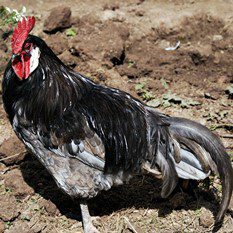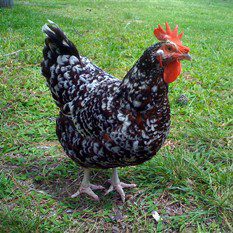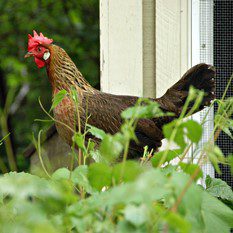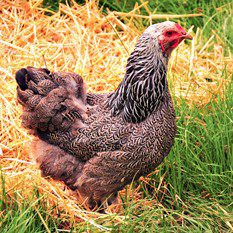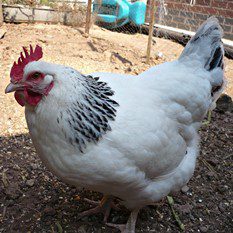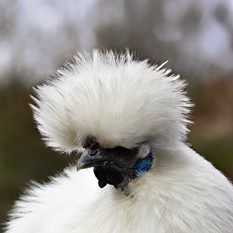SHTFPreparedness may collect a share of sales or other compensation from the links on this page.
Truth be told, there’s so much to learn about raising chickens. However, distinguishing the pros and cons of heritage and hybrid chicken breeds is a good start.
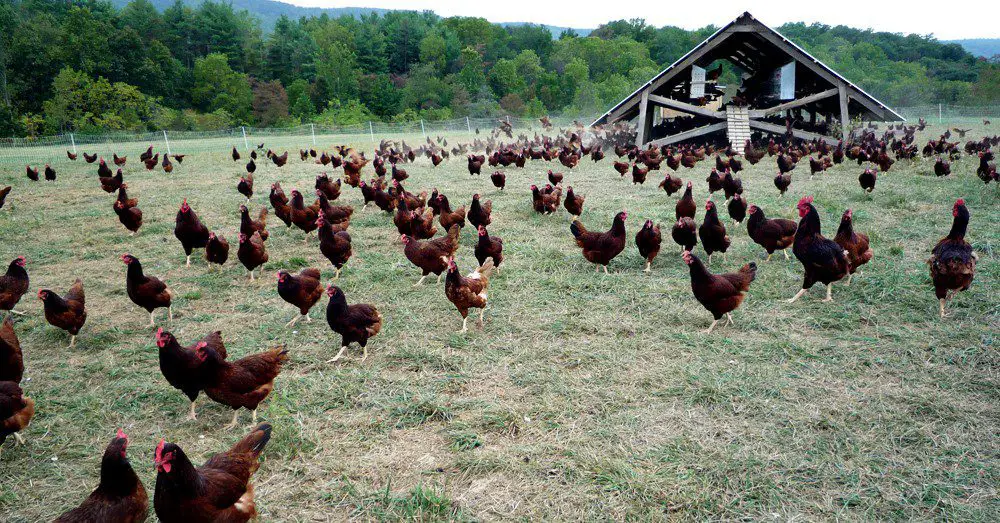
Before you even decide to get a chicken coop and buy chicken supplies, it is important to have a reason to raise chickens:
Do you want them as pets? Are you capable of providing their basic needs? Which breeds suit your requirements best?
Do you think egg production matters? If so, then you are in the right place.
Heritage Chickens
- Andalusian Blue
- Speckled Sussex
- Brown Leghorn
Heritage birds are those that lay about 200 to 250 eggs in a year.
However, during the winter, they stop laying because of the fewer daylight hours. Delaware, Sussex, Rhode Island Red, and Orpington are among the heritage chicken breeds.
Advantages
Sustainability is its biggest advantage.
For most chicken breeders, heritage chickens are the most sustainable options because you can hatch the birds naturally or do it on your own.
But if you plan to raise roosters, make sure to separate them from the rest of the flock. Once they reach a desirable age, you can process them for meat.
On the other hand, the hens can be kept for egg-laying.
They can be raised for eggs and for meat.
With little effort beyond maintenance, you get to enjoy benefits like fresh and organic eggs, as well as the best quality meat.
You help save endangered chicken breeds.
Due to the popularity of hybrid chickens, heritage birds have become second-choice options. Therefore, by breeding and raising them on your own, you are preserving their kind and helping them thrive.
Also, by selling their eggs or hatching them, you are building interest in these breeds.
Disadvantages
There is not much meat.
Perhaps, this is the primary reason why hybrids are more preferred than heritage chickens.
Compared to the chicken meat sold in groceries, their carcasses are somewhat smaller. So, if you are planning to raise them, you might need to breed plenty of them to satisfy your family’s needs.
In addition to that, the meat of heritage birds tastes a bit different. Although it is not dry, it’s a little chewy.
The cost of raising them is a bit higher.
Because you will have to feed them longer than the hybrids, the cost of raising them is a bit higher.
Plus, their meat is tougher because it takes time to grow. Thus, you might want to consider that as well.
Hybrid Chickens
- Dark Brahma
- Light Sussex
- Ornamental
Hybrids are the most popular chickens today because of their purpose in egg production. Cornish rocks and Cornish crosses are among these birds.
Advantages
1. They grow fast, so they can be ready for consumption if a few weeks.
These birds are ready to process in just eight weeks, but they can grow up to 12 weeks. It’s up to you whether or not to consume them right away.
2. The taste is awesome.
Just like the chicken meat you purchase in grocery stores, the taste of a hybrid’s meat is juicy and tasty. With the texture of their meat, you need not ask for anything. They just make excellent ingredients in various recipes.
3. They are not expensive to raise.
Since they grow so fast, you don’t have to keep them with you for long. Aside from that, they get satisfied with their feed nicely. You can even allow them to forage their own food.
Disadvantages
1. Some breeds can’t reproduce by themselves.
There are hybrids that are not capable of reproducing on their own. That implies you have to always go to a hatchery to get some chicks whenever you want to start.
2. They have to be checked from time to time.
Due to the fact that they grow so fast, they are at high risk of developing heart issues or becoming too heavy for their bodies. To avoid this problem, they have to be fed on time.
Also, you might need to monitor them as they eat.
3. They don’t lay enough eggs.
While some hybrids lay pretty good-quality eggs, they only have a short life span.
Additionally, they are not that reliable when it comes to egg production. Nonetheless, you can always use several tips to help your hens lay more eggs.
Conclusion
Obviously, heritage and hybrid chicken breeds have their own unique features. It’s really up to you which of them you want to raise.
But talking about sustainability, which of them do you think is the most sustainable?
The key to sustainability in chicken farming is knowing how to properly use the resources to provide for the chickens. However, if you ask the experts and chicken farmers, they’d say heritage breeds are the most sustainable.
Not only do they survive in varying weather conditions, but their bodies are designed to suit living on the meadowland.
That only means raising them will allow the next generation to witness valuable chicken features and traits, helping new breeds to thrive even in the harshest environments and conditions.

